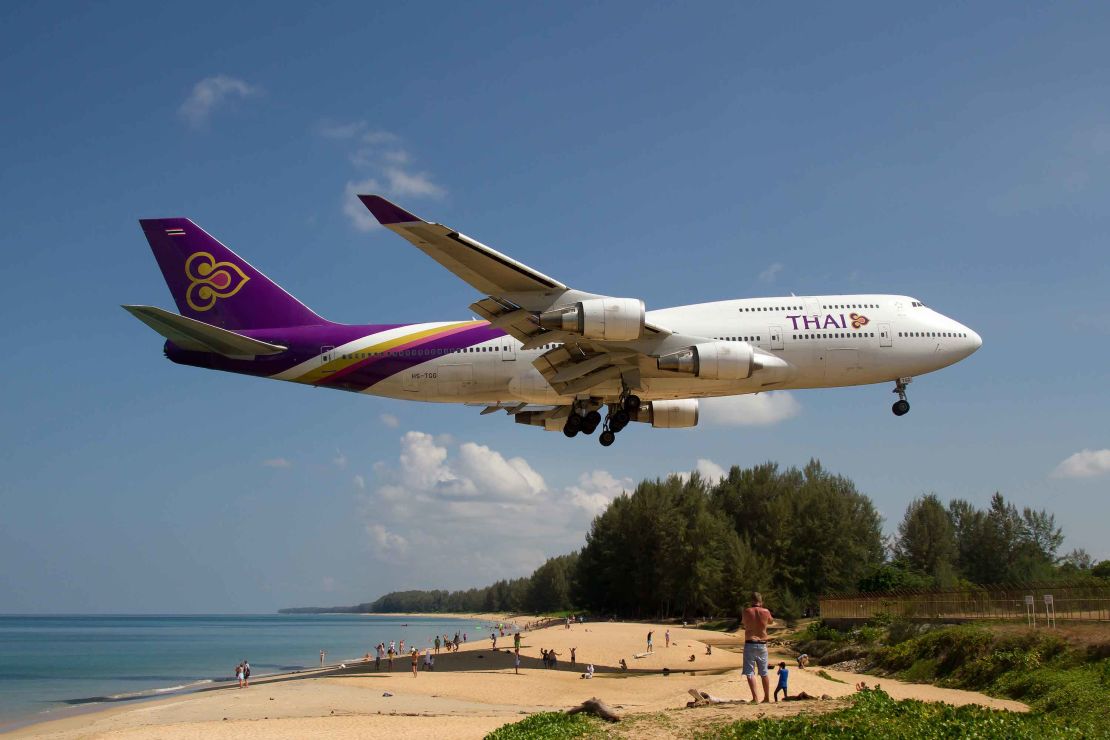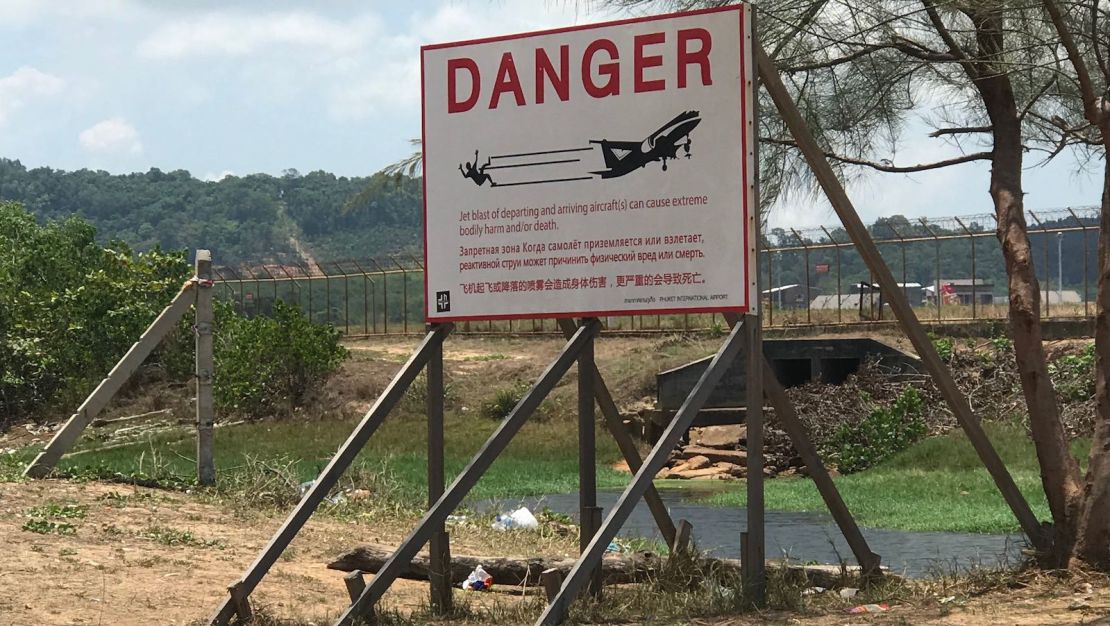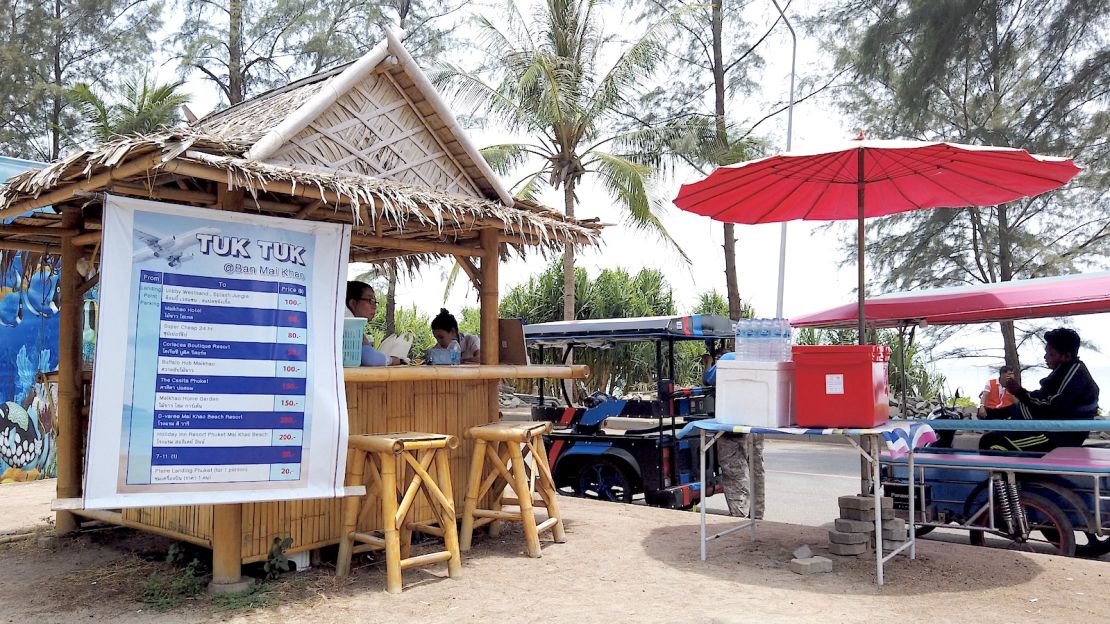It’s 9:55 a.m. and all’s quiet on Phuket’s Mai Khao Beach.
Tourists stand on the shoreline, scanning the cloud-free skies for approaching aircraft, some looking at their phones for flight data.
As the blurry form in the distance begins to take shape, the crowds scatter across the light brown sand, which is already scorching in the 35-degree Celsius heat. A dozen or so more visitors rush out from the shelter of nearby trees to claim their spots on the shore.
Partners, family members and friends dutifully squat down, phones and cameras at the ready.
The plane is now fully visible and the crowd freezes in place, almost in unison. Some pose outlandishly, waving their arms, others morph into their best swimsuit model impressions.
Then, the roar of the Thai Airways Boeing 747 cuts through the air as it glides in overhead before touching down at its destination – Phuket International Airport.

Scenes like this play out every 10 to 15 minutes on average depending on the season, earning Mai Khao Beach a reputation as one of Asia’s top plane spotting locations.
Though many visitors come to pose for photographs, there’s plenty of action for genuine aviation geeks as well. According to Airports of Thailand flight data, 116,487 flights – both international and domestic – moved through Phuket International Airport in 2019.
“I know of enthusiasts who travel from all over the world to visit, and the variety of aircraft you’ll see is pretty impressive owing to the popularity of Phuket as a resort,” says Matt Falcus, founder of Airportspotting.com and author of the World Airports Spotting Guides.
Adding to the appeal, Falcus notes that Mai Khao is one of only a handful of places in the world where you can stand so close to an airliner landing on a beach, “including destinations like St. Maarten in the Caribbean, and Skiathos in Greece.”
Airport officials concerned about beach safety
Not everyone is celebrating the beach’s popularity.
Over the years, airport authorities have repeatedly expressed concerns for the safety of tourists as well as possible security implications. Now, officials are reportedly making moves to restrict access to the popular stretch of sand.
Chula Sukmanop, director of the Civil Aviation Authority of Thailand (CAAT), recently spoke with CNN Travel about the issue, saying they’re working with local authorities to come up with a solution.
The problem, however, is that the beach is part of Sirinath National Park, which is managed by the Department of National Parks. This means it’s not a simple matter of just restricting access to the beach.
“We have requested that Phuket airport officials and concerned provincial offices, together with the local office of Department of National Parks, Wildlife and Plants Conservation – since the land belongs to its office – come up with measures to address the potential security issue,” says Chula.
“As a regulator, CAAT has to make sure that security at all airports is up to international standards. We are thinking about cordoning off the area or keeping tourists further away from the airport. The exact action is yet to be finalized.”
In the meantime, signs posted around the beach warn of the dangers of standing too close to the arriving and departing planes.
Though we didn’t see any incidents during our recent visit, one lifeguard we spoke with said he once saw a stroller – toddler sitting inside – fall over due to the blast of the plane as it passed overhead.
In addition to the potential dangers of standing directly under the jet blasts, the aircraft are incredibly loud; visitors sensitive to noise may want to wear ear protection.
No, you won’t be sentenced to death for taking selfies

Inaccurate media reporting has also complicated the situation for both tourists and authorities.
In March, several international news outlets reported that travelers caught taking photos on the beach in front of the airport would face criminal charges and possibly even execution.
These false stories stemmed from misinterpretation of a local news report that focused on concerns over selfie-taking tourists while also touching on separate punishable issues relating to drones and other acts that can distract pilots.
Chula confirms to CNN Travel that tourists are not breaking any laws by taking photos on the beach – and they most certainly won’t face the death penalty for it.
“This is absolutely not true, one can’t be executed for taking photos,” he says, when asked about the international media reports.
“Taking photos with planes as the background is not illegal but trying to intrude into the airport’s tarmac without permission is illegal. Taking photos of the runway or planes taking off from runway is also not illegal technically, but there is a gray area in which we have to consider if those photos are intended to harm airport security – that could be illegal.”
Know before you go
Matters of the law cleared up, here’s some useful info on how and when to visit.
Mai Khao Beach stretches about nine kilometers along the Andaman coast – it’s Phuket’s longest beach – and the plane spotting section only takes up a sliver of it.
There are a few ways to access the airport portion of the beach, which does not have direct road access from the main highway.
From the south, visitors can park at Sirinath National Park and walk a kilometer or so to access the beach.
A far easier option lies north, where a few entrepreneurial locals, recognizing the popularity of the beach, have set up a convenient shuttle service.
Visitors taking taxis or their own vehicles can drive down local road Soi Mai Khao 6 until they hit the beach.
There’s a booth set up near the parking area, where travelers can pay for a ride to the beach via a tuk-tuk style motorbike with attached side cart. This will take them right to the edge of the plane viewing beach.

Those with motorbikes can access the airport via this road as well but larger vehicles are prohibited.
Planes take off or land regularly every 10-15 minutes or so, depending on the time of day. Websites and apps like FlightRadar24 offer real-time info on plane arrival/departure times.
These will help plane spotters identify the planes they’ve just seen and find out when any particularly special aircraft might be arriving or departing.
Which brings us to another important issue – wind direction.
Because planes take off against the wind, the best time to visit the beach is December to May, when winds blow in from the northwest. At this time, aircraft are more likely to be landing – a far more photogenic scene.
CNN’s Kocha Olarn contributed to this report.

































